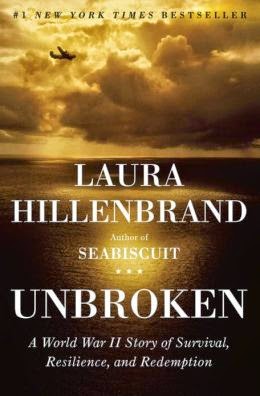Unbroken: A World War
II Story of Survival, Resilience, and Redemption
Laura Hillenbrand
Category: Biography;
History
Synopsis: Bombardier
Louis Zamperini’s rescue plane goes down over the Pacific Ocean in WWII and he
becomes a Prisoner of War in brutal Japanese camps.
Date finished: 19
March 2014
Rating: *****
Comments:
And I thought
Seabiscuit
was good.
I bought this book when it came out several years ago, but I
never wanted to commit myself to the inevitable emotional pain of reading it.
It’s a traumatizing tale of brutality, bravery, and hope. There are times,
though, when hope flags, and you are plunged, like Louis, into despair the
likes of which most human beings never experience. Fortunately.
*I’ll try to give no spoilers, but my review does go beyond what
the Amazon product description reveals.*
Olympic runner Louis Zamperini is a bombardier in the
Pacific theatre in World War II. This is a time in history when planes are
still relatively young. (Lindbergh made his historic flight in 1927; WWII is
not even two decades beyond this.) The fighter planes of this era are new
technology—each “B” plane an improvement over the one before, but each suffered
design flaws. Many planes went down, and when a plane went down in the expanse
of the Pacific Ocean, military rescue efforts, though quickly initiated, were
seldom successful. Into this chaos steps Louis and his team, running a routine
rescue mission for a downed plane and its crew. Their rattletrap plane goes
down, killing all but three of the crewmen. The remaining men drift for 46 days
on life rafts. They endure starvation, dehydration, and a shiver of sharks who
seem to be waiting patiently for their demise. This was my “favorite” part of
the book, which tells you something about what comes next.
The men are eventually “rescued” but Japanese seamen, who
treat them well, before being turned over to a POW camp. This is where their
awful journey turns horrific. The brutality of the camps—unlike any operated in
the European theatre of the same war—is breathtaking. The starvation, forced
labor, and constant beatings are almost too much to bear, even to the reader.
And this goes on for years. The Japanese culture believes that surrender in war
is a great dishonor, and any man who would allow himself to be captured should
endure the harshest treatment because he is weak and lacks pride. A Japanese
soldier would often rather kill himself than be captured.
But ultimately, this is a story of the human nature and the
human spirit. The Japanese knew that humiliation would break a man sooner and
more completely than any other treatment. Many men died. Many survived. Why would
fill whole volumes.
But even with the Japanese surrender and the liberation of
the POW camps, the journey was not over for these young men. Many were unable
to make the transition back to civilian life. Many fought addictions and found
themselves tethered to painful memories, nightmares, and flashbacks. Louis Zamperini
is one of the countless who fought the residual demons every day until he
accepted God and found his way out. He then became a speaker to bring the story
to the states, so it would not be forgotten.
There is so much going on here. So very much pain. I was
left to marvel at two things: the darkness of human hearts and the buoyancy of
the human spirit. These things have been a part of humankind since the
beginning of time—WWII, of course, was not the be-all and end-all of human
cruelty or human triumph. It makes you wonder just how long these stories have
to be repeated before we finally get it.
Never before have I read a book that was equal parts
heartbreaking and life-affirming. Hillenbrand tells the story with sensitivity,
clarity, and mercy, but never glossing over the harsh realities.
I was recently talking to a friend about this book, and he
told me that Angelina Jolie is directing a movie based on it. Apparently, she
read the book and then went in search of Zamperini, who, it turns out, lived in
her neighborhood. The film is set to be released on Christmas Day.
Would you recommend
this to a friend?
Everyone should read this book, lest we forget. Greatest
generation, indeed.
You might also enjoy:
Seabiscuit

























